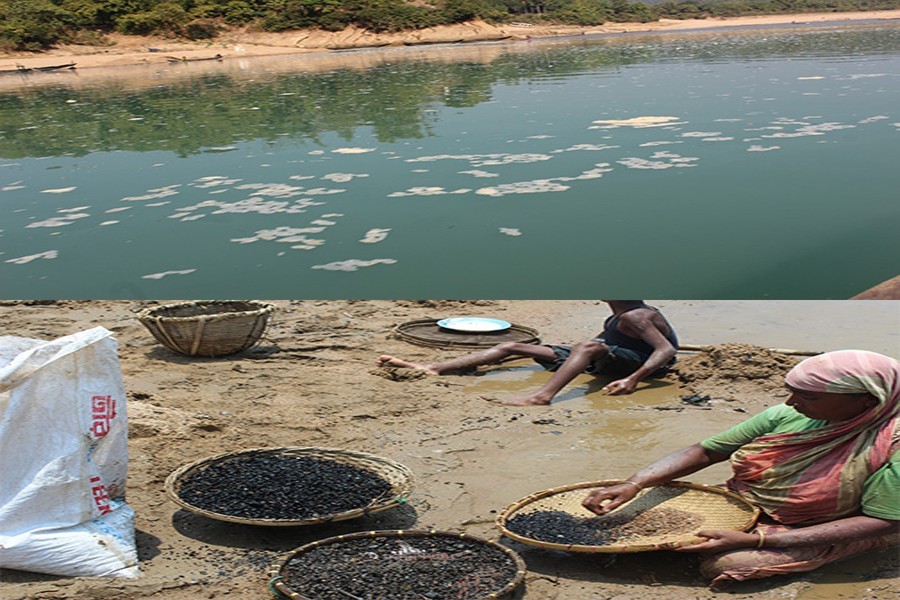The Sari-Gowain River is being polluted due to coal mine drainage from the upstream hilly region. It has been revealed in a research by the academics of Sylhet Agricultural University (SAU). The trans-boundary river, originated from the Indian state of Meghalaya is well-known for its rich aquatic biodiversity.
The Myntdu River of Meghalaya enters Bangladesh in the name of Sari through Lalakhal of Jaintiapur upazila while the Dawki River from Meghalaya enters Bangladesh through Jaflong border in the name of Piain River. The 02 meet Sari River at Mukhtola of Gowainghat upazila and flows as Gowain River which joins the Surma River near Chhatak upazila of Sunamganj.
Contacted, SAU's Department of Aquatic Resource Management Professor Dr. Mrityunjoy Kunda told this correspondent the 80- km long river from Lalakhal to Chhatak is known as the Sari-Gowain River. From April to mid-May every year the rolling water and hilly flash flood carry waste water dispatched from coal mining activities of Meghalaya to the Sari-Gowain River via the Myntdu River, which instantly pollutes the water resulting in mass mortality of fishes and other aquatic organisms.
Moreover, a lot of moribund fishes are found floating at the water surface, Professor Kunda said. The inhabitants of the adjacent villages on both sides of the river can easily catch these fishes while some people collect dust coal and others from river beds.
According to the witnesses, several hundred people catch those fishes with fishing nets, wounding gears and even with bare hands like a festival, Professor Kuda said.
During the research we found large quantities of those fishes are consumed by local communities, he added. On the other hand, most of the fishes caught by the fishers are sold at different markets of Sylhet district and consumers take those without knowing their source. Different kinds of heavy metals emitted from the waste of coal mines become accumulated in those catches or moribund fishes.
Moreover, these coal wastes settle down on the bottom soil of the river and thus emit slowly into water and get mixed in the food chain which increases the intensity of heavy metal in fish. The live fish reach the Surma River and later spread to different adjacent water bodies, which threatens the native biodiversity of those water bodies.
The important research work has been carried out since July 2018 to find out the effect of coal mining drainage, led by Prof. Dr. Mrityunjoy Kunda and financed by NATP Phase-2 project of Bangladesh Agricultural Research Council (BARC). It ends in June 2021.
Dr. Ahmed Harun-Al-Rashid (Co-Principal Investigator) and Mr. Debasish Pandit (PhD student of Prof. Dr. Kunda) are also actively involved with the research works. In this research higher levels of different toxic heavy metals like copper, chromium, cadmium, lead, nickel, etc were detected in the river water, sediment and fish body which crossed the maximum acceptable limit.
These heavy metals are being accumulated in the human body by consuming fish and water from this source, which may cause cancer and other fatal diseases. According to the local fishers, "Within 20-25 years many indigenous species have been disappearing from this river mainly due to coal mine drainage pollution." Not only fish, other aquatic organisms along with natural fish feed are also destroyed by the action of coal mining effluent.
Professor Kunda also said a detailed result would be available as the present research would be completed in June 2021. Further research is needed too, Prof. Kunda suggested immediate steps to find out the way of solution for conserving aquatic biodiversity.


